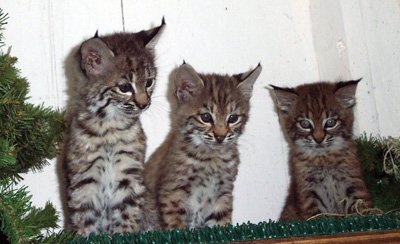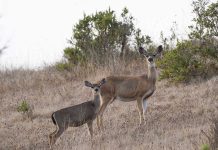For more than 15 years, the Wildlife Education and
Rehabilitation Center of Morgan Hill has been rehabilitating bobcat
kittens using bird-of-prey anti-imprinting methods.
For more than 15 years, the Wildlife Education and Rehabilitation Center of Morgan Hill has been rehabilitating bobcat kittens using bird-of-prey anti-imprinting methods.
This technique ensures that the bobcats don’t become habituated to their human caretakers and remain wild and wary of people when they’re released back to their native habitats.
To make themselves as unlike a human as humanly possible, surrogate bobcat mothers wear full-body costumes scented with herbs and bobcat urine to cover up human odors, remain quiet at all times when within the enclosure and “walk” on their hands and knees.
The method has proven successful with more than 30 bobcats over the years and WERC has been internationally recognized for its bobcat kitten protocols.
Now, once again, WERC is at work making sure that three little kittens will grow up to be truly wild wildcats.
On April 14, bobcat “Morro” was discovered by a hiker in the middle of a field in a Morro Bay park.
He was uncertain whether the mother bobcat had just been frightened away and would return to her kitten when the people were gone from the scene.
However, checking back an hour later, the hiker found that the helpless kitten, only 1-week-old and whose eyes were still closed, was still there and so it was assumed that the mother was either dead or had abandoned her. The kitten was cared for by Pacific Wildlife Care for a few days, and then was transferred to WERC
For the first few weeks of her life, Morro needed to be bottle-fed six times a day by her surrogate bobcat mother, who also spent time grooming the kitten, stimulating the way its natural mother would clean her baby.
“Fresno” was one of four 5-week-old kittens that were discovered when some men were tearing down a shed in Mariposa and inadvertently scared off the mother bobcat.
When the men came back several days later, two of the kittens were gone, one was dead and the fourth was “Fresno.” Park rangers brought him to the Fresno Wildlife Center, where he received care and treatment for a respiratory illness for two weeks before being transferred to WERC May 6.
“Cruz”, the third arrival of the year, was discovered in May near Santa Cruz. Her rescuers had kept watch on the bobcat throughout the day, but the mother never returned to her starving baby and it’s unknown what happened to her or if she had abandoned the 7-week-old kitten.
Native Animal Rescue treated and fed the kitten for several days, then contacted W.E.R.C. about transferring her. On May 29, Cruz was brought to Morgan Hill to join Morro and Fresno in the nursery.
The three little kittens became great “friends,” tumbling and nipping playfully at each other as they ran around the room and over logs.
On June 3, all three bobcats were given a checkup and vaccinations by Dr. Suzanne Colbert (Princevalle Pet Hospital, Gilroy).
The healthy kittens were then brought to WERC’s outside enclosure where they can become accustomed to the weather and will have plenty of space to run and climb.
The surrogate mother will continue to bring them food and play bobcat games with them.
These games help develop the hunting skills that they will use to find food in the wild, such as rabbits and rodents, their main prey. The vet exam and the introduction to their new enclosure were filmed and aired that night on KSBW-8 News.
The fourth kitten to arrive at WERC was found May 27, walking around a plant nursery in Redding. Six-week-old “Shasta” was extremely thin and found to have 18 ticks on her head, a clear sign that she was in poor health since these parasites are especially attracted to sick animals.
At Shasta Wildlife Care, Shasta was fed small rodents and other protein-rich foods and she appeared to be getting better. She was transferred to WERC on May 31 so she could be raised with other bobcat kittens. She was kept under quarantine in order to monitor her health.
The very next morning, Shasta was discovered limp and near death, barely breathing.
She was quickly transported to Princevalle Pet Hospital, where Dr. Nancy Fischer immediately put the bobcat on IV fluids and implemented other emergency care procedures to support the tiny bobcat’s immune system.
The prognosis was poor but Shasta appeared to improve slightly during the day. However, she never regained her spunk and was barely able to lift her head. By midnight, she had died. Sadly, Shasta had been found originally in such dire condition and malnourished, that her little body was apparently too weak to fully recover.
At WERC, we strive to rehabilitate the injured, sick and orphaned native wildlife that come to us. Many are rescued already suffering grievously from terrible injuries, illness or starvation, that despite all our efforts, the animals cannot survive.
We rejoice at each and every release of the birds, mammals and reptiles we have successfully nursed back to health or nurtured to maturity, including the anticipated release this fall of bobcats Morro, Fresno and Cruz back to the areas where they were found.














